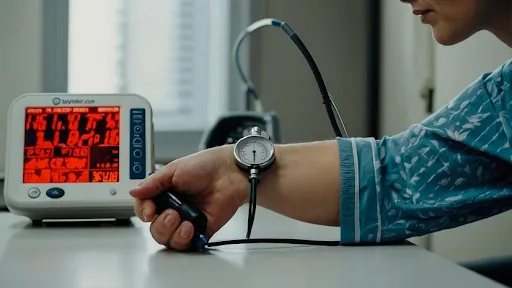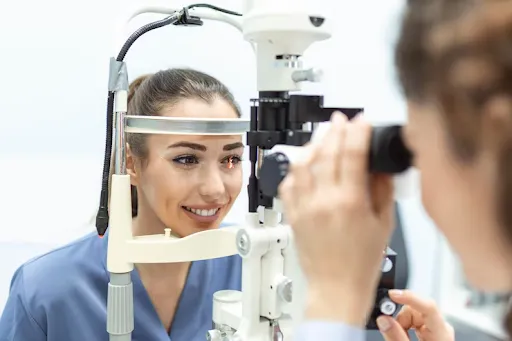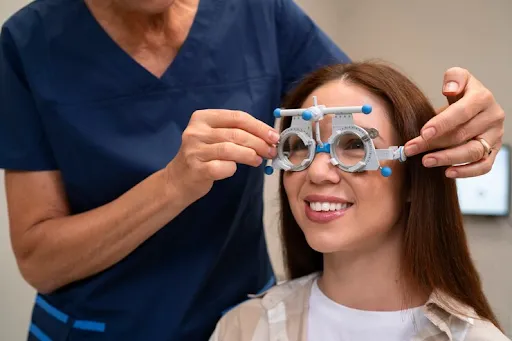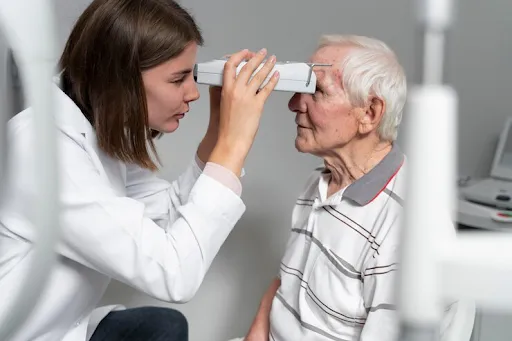Managing Vision Changes
Managing Vision Changes in Patients with Chronic Conditions
FSDAVCFEBFEVSDDVFSD
FSDAVCFEBFEVSDDVFSD
FSDAVCFEBFEVSDDVFSD
Vision Changes and Chronic Conditions
Managing vision changes due to chronic conditions like diabetes, hypertension, and autoimmune diseases requires ongoing specialized care. These health issues can lead to severe complications, such as diabetic retinopathy, hypertensive retinopathy, and optic nerve damage, which may result in permanent vision loss if left untreated. Regular eye exams are crucial in detecting early signs of these conditions, allowing for timely intervention and treatment.
At Kleinwood Vision, we understand the link between systemic health and eye health. Our comprehensive exams help assess how these chronic conditions affect your eyesight, ensuring that changes are identified early. Learn more about how we monitor and manage your vision on our comprehensive eye exams page
Managing vision changes due to chronic conditions like diabetes, hypertension, and autoimmune diseases requires ongoing specialized care. These health issues can lead to severe complications, such as diabetic retinopathy, hypertensive retinopathy, and optic nerve damage, which may result in permanent vision loss if left untreated. Regular eye exams are crucial in detecting early signs of these conditions, allowing for timely intervention and treatment.

At Kleinwood Vision, we understand the link between systemic health and eye health. Our comprehensive exams help assess how these chronic conditions affect your eyesight, ensuring that changes are identified early. Learn more about how we monitor and manage your vision on our comprehensive eye exams page

Diabetes and Vision: The Need for Specialized Care
Diabetes is a major cause of vision loss worldwide, with high blood sugar levels damaging the blood vessels in the retina, leading to diabetic retinopathy. This serious condition can result in blindness if not treated early. Symptoms may include blurred vision, floaters, or even sudden vision loss. Regular diabetic eye exams are essential for early detection and management, helping to prevent long-term complications.
Collaborating with both your primary care physician and a specialized eye care provider is key to managing diabetic retinopathy. Early detection allows for timely interventions like laser treatments, injections, or other medical therapies that can slow the progression of the disease. These treatments aim to preserve your vision and prevent further retinal damage, making routine eye exams crucial for those with diabetes.
In addition to eye care, it’s important for individuals with diabetes to maintain stable blood sugar levels, as fluctuations can cause temporary vision changes. At Kleinwood Vision, our eye doctors use advanced diagnostic tools to detect even the earliest signs of diabetic eye disease. We offer comprehensive treatment options to protect and manage your vision. Visit our page on diabetic retinopathy treatments for more information on preserving your eye health.
Hypertension and Vision Changes

People with high blood pressure are at risk for hypertensive retinopathy, a condition where the retinal blood vessels become damaged. Often symptomless, it can lead to vision loss, macular edema, or optic nerve damage if left untreated, making routine eye exams essential.
During an eye exam, your optometrist can detect signs of the condition by observing narrowing or swelling in the retinal blood vessels. Regular monitoring helps prevent permanent damage while managing both your blood pressure and vision. Learn more on our hypertension and eye care page

managing your blood pressure through medication, lifestyle changes, and a healthy diet is essential for maintaining good vision and preventing eye-related complications. High blood pressure can damage the delicate blood vessels in the eyes, leading to serious conditions like hypertensive retinopathy, which can cause vision loss if not addressed. Regular monitoring of your blood pressure, combined with routine eye exams, helps ensure that any changes to your vision or eye health are detected early. Small adjustments in diet, such as reducing salt intake and maintaining a healthy weight, along with prescribed medications, can make a big difference in your overall health.
If you are diagnosed with hypertension, it's important to work closely with your eye care provider, who will coordinate with your primary care doctor or cardiologist to provide comprehensive care. This integrated approach ensures that both your blood pressure and vision health are managed effectively. Your optometrist will monitor for early signs of damage to the blood vessels in your eyes and recommend the best course of treatment if any issues arise. By staying proactive and following your treatment plan, you can protect your eyesight and reduce the risk of long-term complications related to hypertension.
Autoimmune Diseases and Eye Health
Autoimmune diseases like lupus, rheumatoid arthritis, and multiple sclerosis can severely impact your vision. These conditions often lead to eye problems such as uveitis, dry eye syndrome, and optic neuritis, which can cause inflammation, discomfort, or even vision loss if not treated promptly. Regular visits to an eye care specialist are crucial for those with autoimmune conditions to monitor for any vision changes and prevent long-term damage.
Immunosuppressive treatments, commonly used to manage autoimmune diseases, can also affect eye health. This makes it vital to coordinate care between your rheumatologist and eye doctor for a comprehensive approach to managing both your systemic and eye health. By working together, your healthcare providers can ensure that your treatments address both your autoimmune condition and protect your vision. Learn more about how autoimmune diseases affect vision and available treatments on our page
Coordinating Eye Care with Other Healthcare Providers
For patients with chronic conditions, eye care doesn’t happen in isolation. Your vision health is closely linked to your overall health, making it essential to coordinate care between your eye doctor and other healthcare providers. When managing diseases like diabetes, hypertension, or autoimmune disorders, ensuring that your primary care doctor, specialists, and optometrist are in communication can make a significant difference in the outcome of your vision care. By fostering this collaborative approach, we can help detect potential issues early and tailor a more comprehensive treatment plan to safeguard both your vision and overall well-being
For patients with chronic conditions, eye care doesn’t happen in isolation. Your vision health is closely linked to your overall health, making it essential to coordinate care between your eye doctor and other healthcare providers. When managing diseases like diabetes, hypertension, or autoimmune disorders, ensuring that your primary care doctor, specialists, and optometrist are in communication can make a significant difference in the outcome of your vision care. By fostering this collaborative approach, we can help detect potential issues early and tailor a more comprehensive treatment plan to safeguard both your vision and overall well-being

At Kleinwood Vision, we offer comprehensive, patient-centered care , ensuring that every aspect of your eye health is managed in conjunction with your medical conditions. This integrated approach helps in early detection, timely interventions, and customized treatment plans for patients dealing with complex health issues.

Proactive Eye Care for Chronic Conditions
Managing vision changes caused by chronic conditions like diabetes, hypertension, and autoimmune diseases requires a proactive and consistent approach. These health issues can significantly impact your eyesight over time, often without warning signs in the early stages. Routine eye exams play a vital role in detecting any changes or complications early, enabling timely intervention before they become more severe. Staying vigilant about your eye health is essential, especially when managing ongoing health challenges that may affect your vision.With a proactive care plan, we work to ensure that your vision remains stable and protected as you manage your chronic health conditions.

Managing vision changes caused by chronic conditions like diabetes, hypertension, and autoimmune diseases requires a proactive and consistent approach. These health issues can significantly impact your eyesight over time, often without warning signs in the early stages. Routine eye exams play a vital role in detecting any changes or complications early, enabling timely intervention before they become more severe. Staying vigilant about your eye health is essential, especially when managing ongoing health challenges that may affect your vision.With a proactive care plan, we work to ensure that your vision remains stable and protected as you manage your chronic health conditions.
Specialized treatments tailored to the specific condition you are dealing with can help preserve your eyesight and reduce the risk of long-term damage. For example, diabetic retinopathy can be managed with laser treatments or injections, while hypertensive retinopathy may be controlled by managing blood pressure and undergoing regular eye evaluations. By keeping up with these treatments and working closely with an experienced eye care provider, you can safeguard your vision even as you navigate the complexities of your chronic condition.
Specialized treatments tailored to the specific condition you are dealing with can help preserve your eyesight and reduce the risk of long-term damage. For example, diabetic retinopathy can be managed with laser treatments or injections, while hypertensive retinopathy may be controlled by managing blood pressure and undergoing regular eye evaluations. By keeping up with these treatments and working closely with an experienced eye care provider, you can safeguard your vision even as you navigate the complexities of your chronic condition.
Staying informed about how your chronic condition affects your eyes is key to maintaining long-term vision. Each condition affects the eyes differently, and understanding these impacts allows you to take preventive measures. Whether it's controlling blood sugar levels to avoid diabetic complications or managing inflammation from an autoimmune disease, knowing what steps to take can make all the difference. Discussing these risks with your eye doctor during regular check-ups helps ensure you're on the right path to preserving your vision.
At Kleinwood Vision, our team of highly trained eye care professionals is well-versed in managing complex cases involving chronic health conditions. We encourage patients to maintain regular appointments, stay proactive, and communicate any new or worsening symptoms as soon as they arise.
Staying informed about how your chronic condition affects your eyes is key to maintaining long-term vision. Each condition affects the eyes differently, and understanding these impacts allows you to take preventive measures. Whether it's controlling blood sugar levels to avoid diabetic complications or managing inflammation from an autoimmune disease, knowing what steps to take can make all the difference. Discussing these risks with your eye doctor during regular check-ups helps ensure you're on the right path to preserving your vision.
At Kleinwood Vision, our team of highly trained eye care professionals is well-versed in managing complex cases involving chronic health conditions. We encourage patients to maintain regular appointments, stay proactive, and communicate any new or worsening symptoms as soon as they arise.
Specialized Treatments for Chronic Vision Conditions
There are many treatment options available to manage vision changes caused by chronic conditions. Advanced therapies such as laser surgery can effectively address serious complications like diabetic retinopathy or macular degeneration, offering long-term solutions for vision preservation. These procedures help preserve vision and prevent further damage to the eyes, allowing patients to maintain a higher quality of life.

There are many treatment options available to manage vision changes caused by chronic conditions. Advanced therapies such as laser surgery can effectively address serious complications like diabetic retinopathy or macular degeneration, offering long-term solutions for vision preservation. These procedures help preserve vision and prevent further damage to the eyes, allowing patients to maintain a higher quality of life.
For more routine issues, treatments like prescription glasses, contact lenses, or medicated eye drops can be used to correct vision and relieve symptoms. Your eye doctor will work with you to create a personalized care plan based on your specific condition and needs. By combining these treatments, you can effectively manage your vision health while addressing the underlying chronic disease.
For more routine issues, treatments like prescription glasses, contact lenses, or medicated eye drops can be used to correct vision and relieve symptoms. Your eye doctor will work with you to create a personalized care plan based on your specific condition and needs. By combining these treatments, you can effectively manage your vision health while addressing the underlying chronic disease.
Your Path to Better Vision with Chronic Conditions
If you are living with a chronic condition and notice changes in your vision, it’s important not to delay seeking help. Early intervention is crucial in managing these changes and can significantly impact your ability to maintain your eyesight. Specialized eye care can help detect issues early, allowing for timely treatment and better outcomes. Taking action now can prevent further deterioration and preserve your vision for the future.
At Kleinwood Vision, our experienced optometrists are equipped to handle complex cases involving chronic conditions. We provide comprehensive evaluations and personalized treatment plans to address your specific needs. Don’t wait to address your vision concerns—schedule an appointment with one of our experts today, Contact us. Taking proactive steps now can help safeguard your eye health and improve your overall quality of life.

Contact Info
Hours of Operation
Mon - Fri | 9:00 AM - 5:00 PM
Sat - Sun | Closed
Holiday Hours: We are closed for the following holidays: New Years Day, Memorial Day, Independence Day, Labor Day, Thanksgiving Day, Christmas Day
© 2026 Kleinwood Vision. All rights Reserved.


